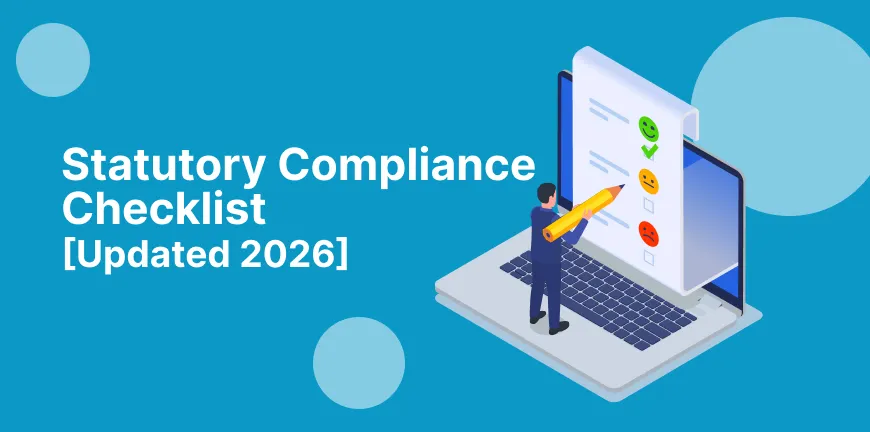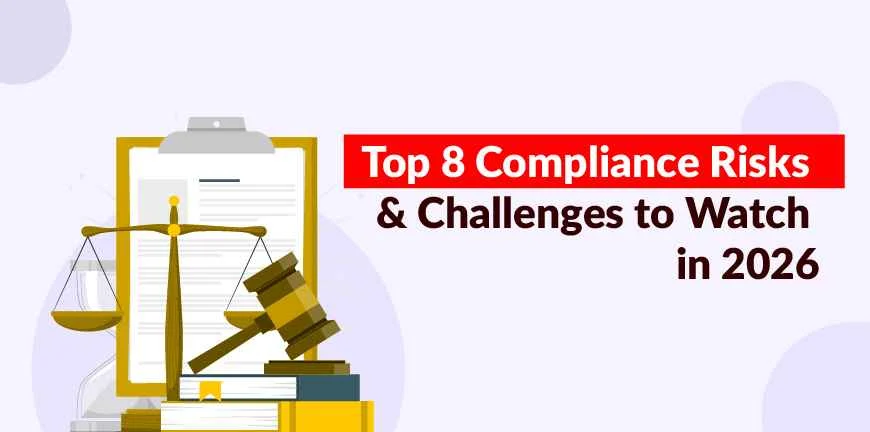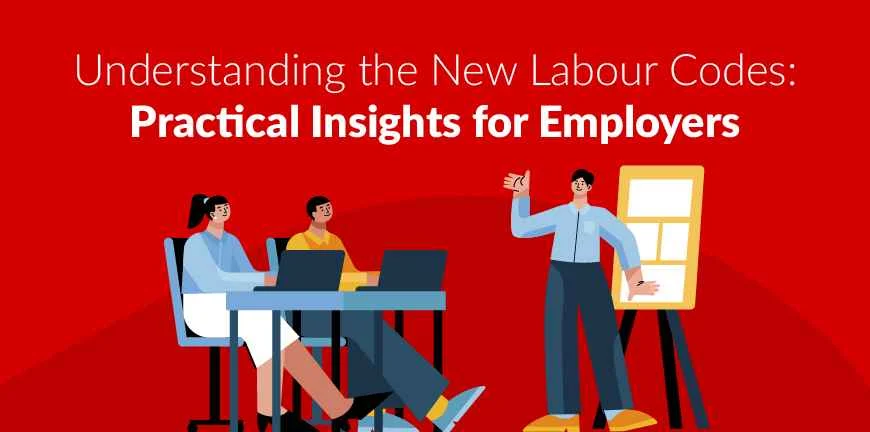
How Tier-2 Cities Are Shaping the Next Wave of GCC Growth in India?
14/11/2025
What is International Recruitment? Definition, Benefits, Best Practices
15/11/2025- What Is Statutory Compliance in HR?
- Why is Statutory Compliance Important for Companies in India?
- Key Labour Laws Covered Under HR Statutory Compliance
- Detailed Updated Statutory Compliance Checklist for 2026
- What are the Benefits of Following Statutory Compliance?
- What Are the Penalties for Non-Compliance in India?
- What Are the Common Challenges in Managing Statutory Compliance?
- How Can ALP Consulting Help You Stay Compliant?
- Frequently Asked Questions
Statutory Compliance is one of the most important responsibilities an HR team of an organization has. Whether for startups, smaller companies, or large corporations, every company must follow rules and regulations set for the employment of workers and company protection by the relevant governing bodies. But the changing laws and the introduction of new codes every year make it difficult to keep track of them. However, it’s mandatory to not just keep up but also adhere to these rules to ensure compliance. Failing to do so can result in damage to reputation and could also invite fines and penalties from the government. You need an HR statutory compliance checklist. But what exactly is statutory compliance?
What Is Statutory Compliance in HR?
Statutory Compliance in Human Resources (HR) refers to adhering to laws and regulations set by the Indian Government to manage employees and ensure organizations don’t face any legal risks or penalties. This involves the central and state labour laws and regulations that ensure employment practices in an organization are fair and legal. In India, with a diverse workforce and complex regulatory environment, a statutory compliance checklist can help maintain an ethical and fair environment.
Why is Statutory Compliance Important for Companies in India?
Managing and following an HR statutory compliance checklist is very important because it ensures companies know about all the legal employment rules and regulations, follow them, and have fair practices. It avoids fines and legal charges that can result from non-compliance, and keeps up the company protection, as well as protects employee rights and has better retention, as employees are also happier. Here are some key reasons why statutory compliance in HR is extremely important.
1. Ensure Legal Adherence
Effective statutory compliance management ensures organizations operate within the framework of applicable laws, preventing legal disputes, penalties, & disruptions to business continuity and reputation.
2. Protect Employee Rights
Statutory compliance safeguards employee interests by ensuring fair wages, benefits, workplace safety, & social security as mandated under various labour and employment laws.
3. Promote Ethical Business Practices
Organisation-wide compliance promotes integrity, transparency, & accountability in operations, strengthening stakeholder trust and fostering a culture of ethical corporate governance.
4. Minimize Financial and Operational Risks
By adhering to statutory obligations, companies can reduce risks of fines, litigation, & financial losses arising from regulatory non-compliance or negligence.
5. Enhance Corporate Reputation and Sustainability
Proper compliance demonstrates responsible governance, builds investor confidence, & boosts brand value, ensuring long-term organizational sustainability and market competitiveness.
Key Labour Laws Covered Under HR Statutory Compliance
Some of the key labour laws that must be covered under HR statutory compliance are-
- The Apprentices Act, 1961
- The Contract Labour (Regulation & Abolition) Act, 1970
- The Child Labour (Prohibition & Regulation Act, 1986
- The Industrial Disputes Act, 1946
- The Minimum Wages Act, 1948
- The Payment of Gratuity Act, 1972
- The Industrial Employment Standing Orders Act, 1946
- The Employees Provident Fund & Miscellaneous Provisions Act, 1952
- The Equal Remuneration Act, 1976
- The Employees’ State Insurance Act, 1948
- The Payment of Bonus Act, 1965
- The Payment of Wages Act, 1936
- The Factories Act, 1948
- The Employment Exchanges (Compulsory Notification of Vacancies) Act, 1959
- The Trade Unions Act, 1926
Detailed Updated Statutory Compliance Checklist for 2026
Here is a clear and detailed statutory compliance checklist for 2025-2026 that companies must keep up with and follow-
1. Provident Fund Compliance- EPF Act, 1952
The provident fund compliance makes sure that there is a chunk of saved money in an account for employees to us when they retire or for other emergencies. Companies that have more than 20 employees must provide PF. They must register with the EPFO. 12% of the basic salary of the employee and daily allowance from employee wages as well as 12% of the employer’s share go into the PF.
2. Employee State Insurance (ESI)- ESI Act, 1948
It is a social security law that ensures workers are provided with benefits required if they have health issues or are on maternity leave. Any organization with more than 10 employees must adhere to the ESI Act. 0.75% of wages will be deducted from employees, and 3.35% of wages will be contributed by the employer. Monthly returns and contributions are submitted online.
3. Professional Tax (PT)
A state tax applies to all employees who receive salaries. It applies to different states, depending on their state laws. PT is deducted from salaries as per the state slabs. The deposits are made monthly/quarterly, depending on the rules and filing returns.
4. Income Tax (TDS in Salaries) – IT Act, 1961
Law requires employers to deduct tax from employee salaries every month based on employee declarations. The deposits are made to the government on the 7th of every month. Form 16 is issued to employees every year.
5. Gratuity- Payment of Gratuity Act, 1972
Employees who have served for a long time in an organization receive this amount. Companies with more than 10 employees must abide by this Act. If an employee has completed 5 years of service, they are eligible for it. Calculate at 15 days’ wages for each year of service.
6. Bonus- Payment of Bonus Act, 1965
This act ensures a yearly bonus if the employee is earning up to Rs. 21,000 per month. The bonus comes up to 8.33% to 20% of annual wages.
7. Shops and Establishments Act (State-specific)
Regarding holidays, leaves, working hours, and conditions, there are specific state-level laws imposed in shops and offices. All businesses must abide by it. Register your business, maintain proper records of attendance, salary, and holidays, and renew registration as per state rules.
8. Maternity Benefit Act, 1961
This is a law that’s imposed to ensure that women are pregnant and, after childbirth, are protected and given some rights. They are awarded with 26 weeks of paid maternity leave, they are allowed to work from home when possible, and make sure they aren’t discriminated against.
9. Equal Remuneration Act and POSH Act
This Act ensures there is no sexual harassment and every employee is paid fairly for the work they do and the duties they perform. POSH Act ensures the prevention of sexual harassment. An internal complaints committee is set up to formally receive and address workplace complaints. Employees are trained to create awareness, and annual compliance reports are submitted.
10. Contract Labour (Regulation and Abolition) Act, 1970
This Act dictates how contract workers must be treated and engaged in the workplace. Companies that have more than 20 workers must abide by the Act. Contractors must provide PF, ESI, and wage benefits.
11. Factories Act, 1948 (for Manufacturing Units)
This Act dictates rules and regulations to be followed to ensure safety for workers in factories and industries. Mostly, manufacturing companies are the ones which it applies. The rules stated ensure the maintenance of the health, safety, and welfare of workers. This means if they have worked overtime or more hours, they must be paid accordingly.
12. Annual Compliance Calendar
A yearly compliance routine that covers monthly, quarterly, and annual filings. Monthly, companies must take care of PF, ESI, TDS challans, and returns. Every quarter, TDS returns must be filed, and PT returns must be filed.
13. Changes that may take place in 2026
New labour codes have been introduced in order to make calculations, overtime rules, and social security contributions easier.
- Wage Code, Social Security code, industrial relations code, and occupational safety and health code, all of which will ease the process, reporting, and scheduling.
- Basic pay meaning and overtime rules can be updated. Companies will revise salary structures to comply with minimum basic pay thresholds.
- Social Security Code now plans to include gig and platform workers under statutory benefits like maternity, health insurance, and pensions.
- The ESIC is running a dispute resolution scheme indefinitely through 2026. This can help resolve past disputes like missed penalties and contributions.
What are the Benefits of Following Statutory Compliance?
1. Avoids legal penalties
Maintaining compliance with labour laws ensures that companies don’t get fined or face penalties or other legal issues.
2. Risk management
By adhering to all the rules and regulations, companies can avoid the risk of incidents in the workplace or other disruptions like strikes, etc, that can halt operations.
3. Boosts reputation
Adhering to labour laws shows how serious a company is about ensuring proper operations as well as protecting worker rights. This boosts their reputation.
4. Better business efficiency
Having the proper compliance procedures and policies not only eases workflows but also increases the efficiency of the business.
5. Attracts investors
When a company is compliant, automatically, it attracts investors as they can see stability in the company’s operations and mindset.
What Are the Penalties for Non-Compliance in India?
Non-compliance leads to companies facing various kinds of violations depending on what they don’t follow or adhere to.
1. General Penalties
Not complying with the Companies Act can result in monetary fines, disqualification. This could include fines upto Rs. 10,000 with a fine of 1000 extra per day. Some violations even lead to imprisonment.
2. Annual Filing defaults
Not filing annual returns on time can attract late fees of Rs 100 per day. Delays can result in sending default notices. The director may be removed from the holding office if non-filing continues for three consecutive financial years.
3. Director-related violations
Not appointing a director or not adhering to the compliance requirements with director requirements can result in penalties. Defaulting directors can face fines from 50,000 to 5,00000, depending on the seriousness of the violation. Criminal charges can also be imminent in some situations.
4. Auditor-related non-compliance
Not appointing an auditor can result in a fine for the company as well as the director. The minimum penalty is 25,000, which increases depending on the duration and nature of the default made. Misinterpretations or forging financial statements can lead to imprisonment up to 10 years and a fine of up to three times the fraud amount.
5. Business operations violations
Restricted business activities, such as financial investments, can result in action for both the MCA and the RBI. Fine of 1000 rupees per day to 1,00,000 rupees can be imposed. If share transfers are not made properly, or board decisions are not taken properly can lead to compliance violations.
What Are the Common Challenges in Managing Statutory Compliance?
- Complex and distinct labour laws posed by the central and state governments make it hard for businesses operating in multiple states to maintain compliance.
- Documentation procedures and requirements differ from state to state.
- Not keeping proper documents of employee and payroll details can lead to non-compliance.
- Not having proper registers and records can become an issue during compliance audits.
- Filing of PF and ESI delays can result in penalties.
- In-house HR departments may not have compliance experts, leading to a lack of updates on labour laws
- Tracking of work hours for various employees, especially those working in hybrid environments and remote environments, can be challenging
- With various types of work models, defining proper labour rights for all has become difficult.
- Protecting and securing employee data across borders while ensuring compliance is quite a challenge.
How Can ALP Consulting Help You Stay Compliant?
Alp Consulting has been managing statutory compliance for over a decade. With rich experience already in talent management and acquisition, Alp can not only manage your compliance needs directly but also hire people who can help with your compliance needs. We have a solution for every compliance problem you may have, no matter how big or small. Talk to us today.
Frequently Asked Questions
1. What is HR statutory compliance in India?
Statutory compliance in HR refers to the legal framework that an organization should adhere to in dealing with its employees.
2. What are the new compliance updates for 2026?
The Digital Operational Resilience Act (DORA) will be expanded to bring smaller financial institutions under the regulations. Stricter ESG reporting requirements, Organisations that use AI tools for recruitment and screening must meet strict requirements for transparency and fairness. The FEC (Financial Economic Crime) guidelines are being tightened. This means that the well-known ‘Know Your Customer’ obligation will be extended to a broader ‘Know Your Employee’ obligation. Make your compliance measurable with the right KPIs.
3. What are the penalties for non-compliance?
Financial penalties/fines, interest on unpaid taxes, imprisonment, failing to file annual returns, e-invoicing non-compliance, and digital personal data protection (DPDP).

Hariharan Iyer
Hariharan Iyer is the Vice President – Operations at ALP Consulting, bringing over 40+ years of experience in HR outsourcing and labour law compliance. He leads end-to-end HRO operations, ensuring process efficiency, statutory compliance, and seamless service delivery for clients across industries. With a strong background in labour law governance and workforce management, Hariharan plays a key role in driving operational excellence and compliance-led HR solutions at ALP Consulting.




